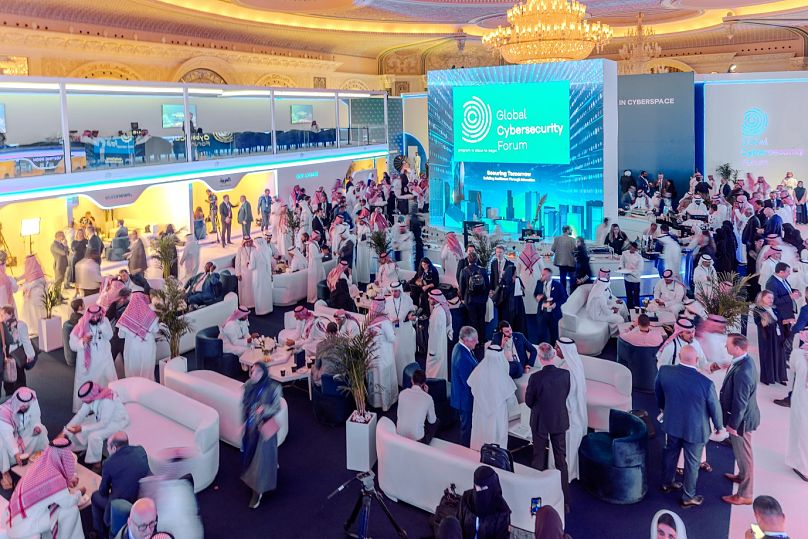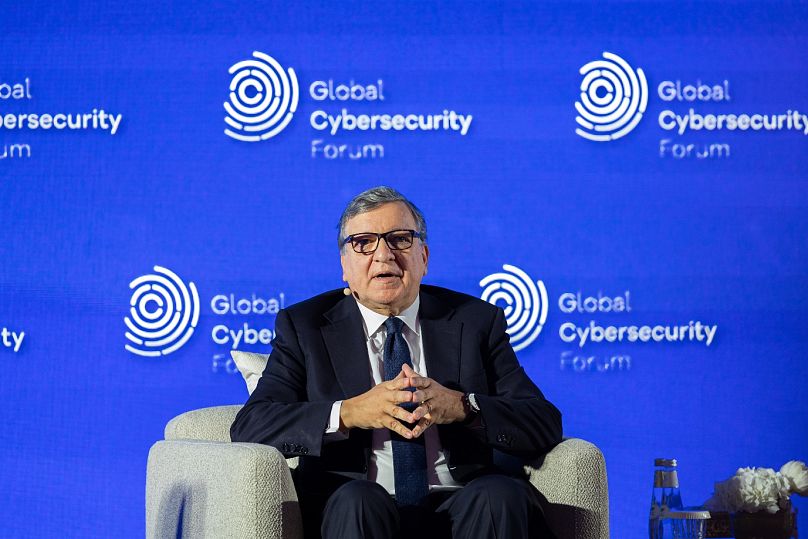The world needs to take action together to thwart potentially catastrophic cyber attacks, Interpol warns.
Governments, business leaders and the public must take a collective approach to combatting online dangers, according to Bernardo Pillot, the organisation’s assistant director of cybercrime operations.
Speaking at the Global Cybersecurity Forum in Riyadh today, he joined leaders from the kingdom and international businesses, as well as former heads of state, to outline the benefits cross-border co-operation is having already in a fragmented cyber landscape, with a new international policy framework in the pipeline.
“What we're seeing is a change in how countries work together,” he says. “We’re very active in the UN [with] ad hoc committee processes and a new cyber convention being negotiated.
“We've been part of that process from the very beginning, and it allows countries to be on the same page when it comes to exchanging information. Because cyber is borderless, we need the ability to act quickly and exchange information to avoid these threats.
“We all come together and our goal is to reduce the impact of cybercrime and protect communities for a safer world.”
Founded by the National Cybersecurity Authority, the two-day forum aims to unite thought-leaders to address major challenges in Cyberspace. It is being held under the theme “charting shared priorities in Cyberspace”.
Globally, cybercrime is expected to cost victims – both customers and institutions – EUR7.6 trillion ($8 trillion) by the end of the year, according to Cybersecurity Ventures.
It follows a prediction made by the World Economic Forum in January about an imminent “catastrophic” global cyber attack, with 86 per cent of business leaders and 93 per cent of security experts surveyed expecting one in the next two years.
Pillot says the biggest cybersecurity threats stem from ransomware attacks, which have risen over the last three years in industries such as healthcare, education and critical infrastructure.
However, while some ransomware threats can only be fought through vast government-led funding to keep up with criminals’ evolving hacking techniques, others are much simpler to tackle.
“We find that a lot of the vulnerabilities can be prevented if people patch their systems,” he says. “Education is key and training employees on cyber security measures is critical to be safe online.”
The event in Saudi Arabia’s capital aims to explore five main themes: Cyberspace amidst polycrisis, cyber growth unlocked, across cyber divides, inside cyber minds and emerging cyber horizons.
And according to Majed Al-Mazyed, governor of the kingdom’s National Cybersecurity Authority, each needs to be taken into consideration to secure our future, unite global communities and unlock the Cyberspace’s potential during an era of exponential growth.
He adds: “We are committed to bridging social and developmental divides, making sure no one is left behind, and unleashing the potential of Cyberspace to ensure that its opportunities are accessible to people all over the world, including our most under served communities.”
This year, artificial intelligence has been front and centre of technological growth while playing an increasing role in everyday life, spearheaded by the likes of ChatGPT.
But as it ingratiates itself into our lives, the risk of it being used for cyber attacks rises in tandem, according to former president of the European Commission José Manuel Barroso.
“Technological developments like artificial intelligence, quantum computing and others are making it easier to challenge cybersecurity,” he says.
“Cyber attacks can become more frequent and more devastating as a result.”
He also calls for a proactive approach and further collaboration when addressing geopolitical tensions, with cyber attacks playing a greater role in conflicts.
Gender disparity is also a concern within the cybersecurity industry, with only 25 per cent of jobs in the field currently held by women. Ahead of tomorrow’s female-focused “Cyberspace Needs You” panel, former Austrian minister of Economy and Digital Affairs and board member of Aramco Digital, Dr Margarete Schramböck, praised Saudi Arabia’s progressive workforce. “Here in Saudi Arabia, 58 per cent of engineers are female and you will find more cybersecurity engineers and female engineers in companies than in Europe,” she adds.
“If you want innovative products and competitive products, we need women. We need their knowledge to reduce the digital gap and the gap in cybersecurity. “There are a lot of initiatives underway but more need to be done all around the world.”



